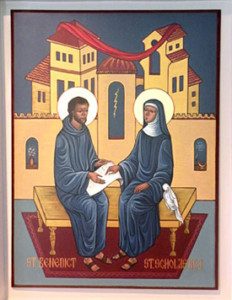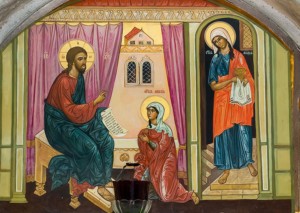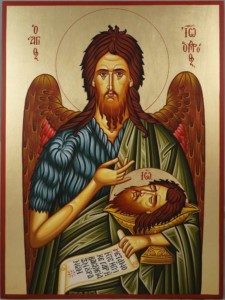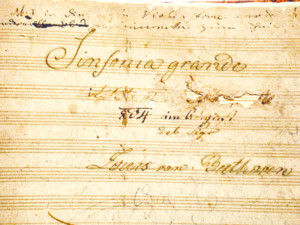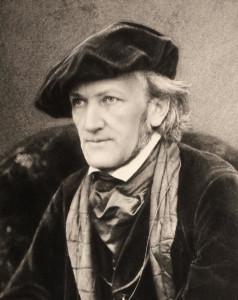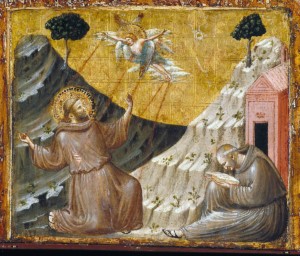What we do know from Scripture is that after the Ascension, the Apostles did not immediately go out and start preaching. Jesus told them to wait in the city until they were clothed with power from on high, the Holy Spirit. He also told them that the Holy Spirit would remind them of everything He had told them. And indeed, we will see next week that the gift of the Holy Spirit transforms the Apostles into men on a mission to spread the gospel.
But back to today: where exactly are we in this story? I’d like to make two points about the liturgy today, relevant to the Ascension.
First what are we doing at the liturgy? Are we simply commemorating something that happened 2000 years ago, and meditating together on Jesus’s triumphant entry into heaven? There’s nothing wrong with doing this, and, in some sense, we do this every time we pray the Second Glorious Mystery of the rosary. But in the liturgy, something else is happening. We are touching eternity, and there is a sense that we are being invited to enter personally, truly into the dynamism of the mystery that we celebrate, that it is we who are ascending into heaven, the Body of Christ ascending with Jesus Christ the head of the Mystical Body.
On Ascension Thursday, in the opening prayer, called the Collect, we prayed this: “Where the Head has gone before in glory, the Body is called to follow in hope.” So we are following Christ toward heaven, and we do this by the theological virtue of hope. Maybe a good way to look at this is that objectively speaking, we are saved, we are ascending into heaven, it’s happening. But subjectively, we don’t fully feel or experience all the effects just yet.
What keeps us from experiencing the full effects? What is the purpose of waiting, of hope? Where are we going?
We are going toward God, Who is infinitely mysterious. We can never fully grasp Who God is or what it means to share life with Him. There is always some aspect of God towards which we are in the dark. This is why at the Monastery, we follow the ancient custom of the Church by not lighting the Easter Candle during Ascensiontide. We had seen Jesus resurrected in the flesh, but then he ascended, going before us toward the Father. We lost sight of Him, at least as we had known Him before. This absence is a reminder that, however well we know God at this point, there is still more to be revealed and discovered.
During Ascensiontide, we are in the position of waiting for Jesus to be revealed in a more profoundly spiritual manner. And this requires the gift of the Holy Spirit.
Now if you look in the leaflet that we put out for you that has the translations of the prayers, you will see how we are asking God today to help us experience Jesus’s abiding presence. We ask that we may, like Christ, pass over to the glory of heaven, and so on. Now, returning to this idea that our knowledge of Jesus and of God the Father will always be less than the reality, we can see a bit more what we are doing today and why we celebrate this each year.
We are always in the state of needing the Holy Spirit to enlighten our hearts, to give us a stronger faith. We are always, to some extent, in the dark about the reality of God. So we should pray every day to the Holy Spirit: come Holy Spirit, and fill the hearts of your faithful. Today’s liturgy puts us right in the middle of this dynamic of rising ever closer to the reality of heaven that we seek.
Alright, I promised two points about the liturgy. Here is number two. I asked earlier about what we are doing at the liturgy, and now we should ask what the liturgy is, exactly.
The Second Vatican Council taught that the liturgy is the action of Jesus Christ the high priest. So what we are doing every time we gather for the liturgy is making visible to ourselves and the world what Jesus in glory is doing for us and the world. We are not doing this ourselves, hoping to get God’s attention. God has fundamentally initiated this encounter, and we are merely responding, as best we can. And what Jesus Christ the high priest is doing is uniting us to God, giving us a glimpse into heaven itself, which He can do in his human nature, now that He has ascended.
This reveals that somehow human nature is not an abstract quality that we each participate in. Rather, in some mysterious way, our natures are made for union with each other at this spiritual level. This is why we can say that Christ, in His human nature, has raised all of us up to heaven. And while we are made for union, this unity is something that Christ invites us to achieve with His help by our willingness to make a sacrifice or gift of ourselves to God and to each other. This is why Jesus prays in today’s Gospel, “that they may all be one.”
And is this not the great gift that the Church can offer the world at the moment, a vision of human unity in God? Certainly Pope Leo believes this, which is why we chose as his motto, “In the One, we are one.”
We begin that work at the liturgy itself. This begins with our turning our hearts and minds toward Jesus seated at God’s right hand, as we sing each Sunday in the Gloria, and then asking Him to deepen our faith, to illuminate our minds at a more intensely by the gift of the Holy Spirit. He responds by sending the Holy Spirit to consecrate the bread and wine, to unite us by the sharing of the One Body. Then, like the Apostles, we are sent into the world to share what we have heard and seen.
Those waiting for us in the world are often experiencing profound uncertainty and unease. Let us be the presence of Christ for them.
